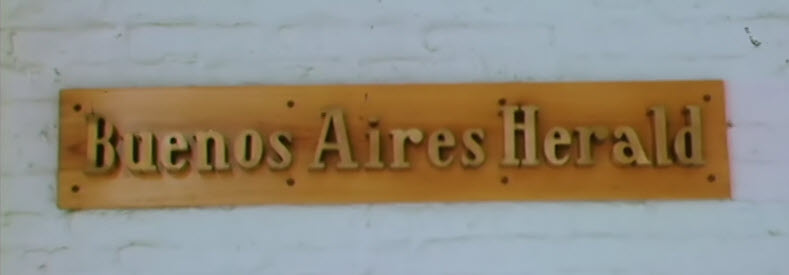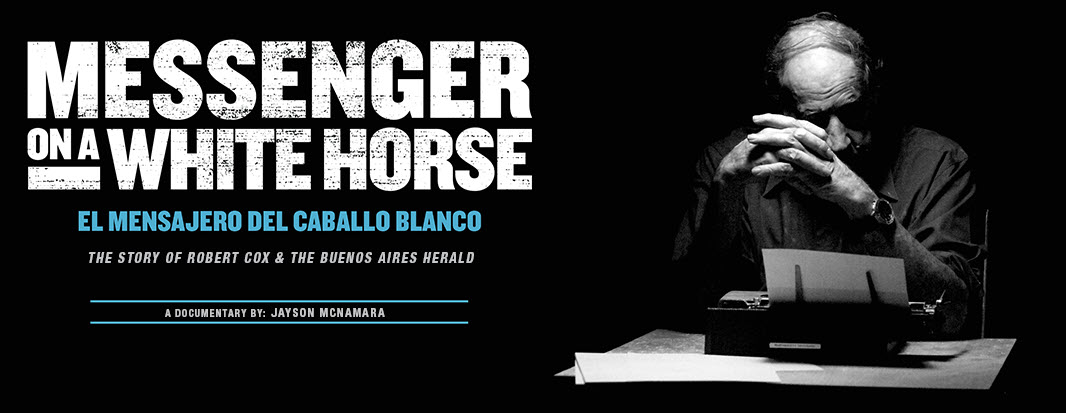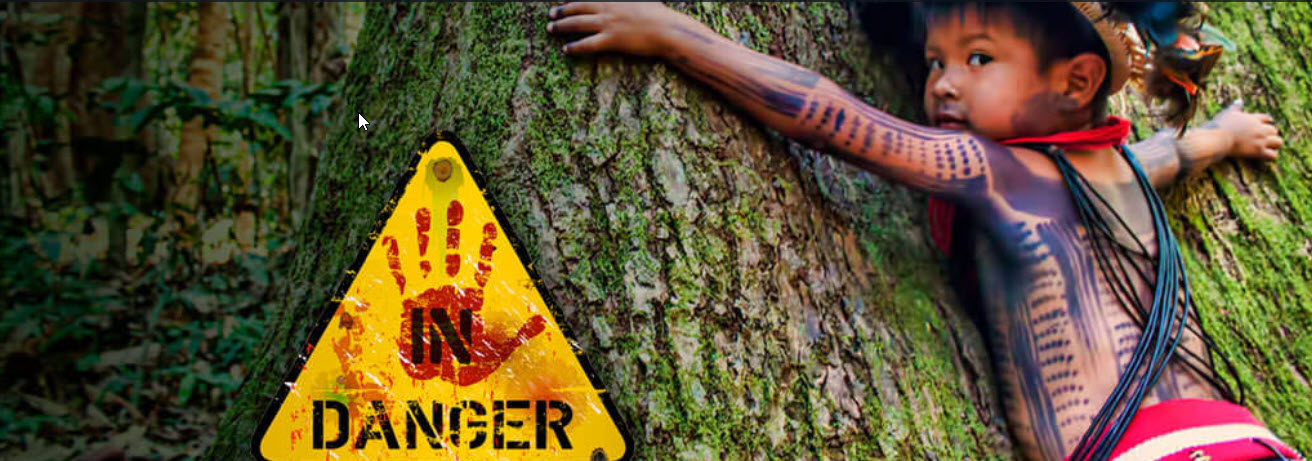Film Review: El Mensajero. Jayson McNamara (2016)
English title: “Messenger on a White Horse’
During the murderous years 1976-83, from the Argentine coup to the Falklands War, and especially during the worst years 1976-79, one newspaper defied the suppression of news about disappearances and state killings. It was the venerable English-language
Buenos Aires Herald. A holdover from the days when Argentina was known, as the ‘sixth dominion’ where people went from Britain to join the local oligarchy and manage trade and finance, while Italians, Germans and Eastern Europeans came to swell the ranks of a nascent proletariat and middle class, the
Herald was edited by Robert (Bob) Cox, born in Enfield, who was settling into a quiet journalist’s life after marrying a local woman with whom he brought up five children.

The comfortable life was not to be. Cox could have enjoyed his comfort, as so many did, by casting a blind eye to the violence of the dirty war, but as the evidence piled up he chose the path of integrity, of a journalism for which reporting the truth placed him in serious danger and forced him to stand up in defence of the defenceless. Before the 1976 coup the country was already the scene of two fierce conflicts: the revolt of shop-floor and grassroots popular movements against the Peronist establishment and union bureaucracies, and a shadowy (‘dirty’) war in which a small number of armed revolutionaries inspired by various combinations of Peronism and marxism were supported by vast contingents of sympathizers mobilized most prominently under the banners of Peronist Youth. Against them the ‘deep state’ deployed unofficial fascist networks and death squads who used torture and murder against them and also against their passive supporters extending even to the psychoanalysts whose names appeared in their address books.
With the coup the dirty war emerged from the shadows, with no regard for the law of war, the law of the country, or least of all the law of human rights. The military government cynically placed itself in the forefront of a war for the defence of western civilization. Bob Cox had gone along with the ‘thesis of the two evils (‘los dos demonios’) and expected the military to bring both of them to heel, not realizing that the practitioners of fascistic violence were themselves an undercover branch of the military. But as it became apparent that sinister things were under way he began to report on them. People were coming to his office and he was checking and then printing their stories, sometimes in Spanish as well to drive the point home. He was to become a hero of the Madres de la Plaza, the women in white scarves who were looking for their sons and daughters, and were the first to come out in public against the campaign of disappearances, meeting once a week to walk in silence around the Plaza de Mayo in front of the seat of government. Three of the Madres, and two French nuns who worked and walked with them, were kidnapped and killed.

In this documentary Bob Cox himself appears live as an elderly and very strong figure together with abundant footage from the time, depicting him as the embodiment of a certain sort of idealized Englishness: immoveable, expressing scarcely any visible emotion, and very courageous. He was criticized for never expressing sympathy for the ideologies of the victims, apart from the Madres themselves. Whatever their beliefs or even crimes – for some of the revolutionaries had been involved in attacks on civilian as well as military targets, the
Herald defended their right to due process. The leaders and spokeswomen from the Madres show extraordinary fortitude in their interviews, as they have done over the last 40 years (yes… 40 years).
Also appearing are the
Herald journalist Uki Goñi, well known as author of books revealing how Nazis got to Argentina, and another journalist on the
Herald Andrew Graham-Yooll, born in Argentina to parents who had come from Britain, who had to leave in 1976, and devoted himself to denouncing the dirty war, returning in the 1990s as Editor-in-Chief.
The film culminates in a cavernous courtroom, with the conviction of the members of the junta and then an image of Bob Cox, now in his mid-eighties, standing against the background of the ocean in his old overcoat, still steadfast. It is a strong, often highly emotional, tribute to him and also to the Madres de la Plaza.
http://www.batimes.com.ar/news/culture/robert-cox-i-decided-to-become-a-reporter-again.phtml
 The comfortable life was not to be. Cox could have enjoyed his comfort, as so many did, by casting a blind eye to the violence of the dirty war, but as the evidence piled up he chose the path of integrity, of a journalism for which reporting the truth placed him in serious danger and forced him to stand up in defence of the defenceless. Before the 1976 coup the country was already the scene of two fierce conflicts: the revolt of shop-floor and grassroots popular movements against the Peronist establishment and union bureaucracies, and a shadowy (‘dirty’) war in which a small number of armed revolutionaries inspired by various combinations of Peronism and marxism were supported by vast contingents of sympathizers mobilized most prominently under the banners of Peronist Youth. Against them the ‘deep state’ deployed unofficial fascist networks and death squads who used torture and murder against them and also against their passive supporters extending even to the psychoanalysts whose names appeared in their address books.
With the coup the dirty war emerged from the shadows, with no regard for the law of war, the law of the country, or least of all the law of human rights. The military government cynically placed itself in the forefront of a war for the defence of western civilization. Bob Cox had gone along with the ‘thesis of the two evils (‘los dos demonios’) and expected the military to bring both of them to heel, not realizing that the practitioners of fascistic violence were themselves an undercover branch of the military. But as it became apparent that sinister things were under way he began to report on them. People were coming to his office and he was checking and then printing their stories, sometimes in Spanish as well to drive the point home. He was to become a hero of the Madres de la Plaza, the women in white scarves who were looking for their sons and daughters, and were the first to come out in public against the campaign of disappearances, meeting once a week to walk in silence around the Plaza de Mayo in front of the seat of government. Three of the Madres, and two French nuns who worked and walked with them, were kidnapped and killed.
The comfortable life was not to be. Cox could have enjoyed his comfort, as so many did, by casting a blind eye to the violence of the dirty war, but as the evidence piled up he chose the path of integrity, of a journalism for which reporting the truth placed him in serious danger and forced him to stand up in defence of the defenceless. Before the 1976 coup the country was already the scene of two fierce conflicts: the revolt of shop-floor and grassroots popular movements against the Peronist establishment and union bureaucracies, and a shadowy (‘dirty’) war in which a small number of armed revolutionaries inspired by various combinations of Peronism and marxism were supported by vast contingents of sympathizers mobilized most prominently under the banners of Peronist Youth. Against them the ‘deep state’ deployed unofficial fascist networks and death squads who used torture and murder against them and also against their passive supporters extending even to the psychoanalysts whose names appeared in their address books.
With the coup the dirty war emerged from the shadows, with no regard for the law of war, the law of the country, or least of all the law of human rights. The military government cynically placed itself in the forefront of a war for the defence of western civilization. Bob Cox had gone along with the ‘thesis of the two evils (‘los dos demonios’) and expected the military to bring both of them to heel, not realizing that the practitioners of fascistic violence were themselves an undercover branch of the military. But as it became apparent that sinister things were under way he began to report on them. People were coming to his office and he was checking and then printing their stories, sometimes in Spanish as well to drive the point home. He was to become a hero of the Madres de la Plaza, the women in white scarves who were looking for their sons and daughters, and were the first to come out in public against the campaign of disappearances, meeting once a week to walk in silence around the Plaza de Mayo in front of the seat of government. Three of the Madres, and two French nuns who worked and walked with them, were kidnapped and killed.
 In this documentary Bob Cox himself appears live as an elderly and very strong figure together with abundant footage from the time, depicting him as the embodiment of a certain sort of idealized Englishness: immoveable, expressing scarcely any visible emotion, and very courageous. He was criticized for never expressing sympathy for the ideologies of the victims, apart from the Madres themselves. Whatever their beliefs or even crimes – for some of the revolutionaries had been involved in attacks on civilian as well as military targets, the Herald defended their right to due process. The leaders and spokeswomen from the Madres show extraordinary fortitude in their interviews, as they have done over the last 40 years (yes… 40 years).
Also appearing are the Herald journalist Uki Goñi, well known as author of books revealing how Nazis got to Argentina, and another journalist on the Herald Andrew Graham-Yooll, born in Argentina to parents who had come from Britain, who had to leave in 1976, and devoted himself to denouncing the dirty war, returning in the 1990s as Editor-in-Chief.
The film culminates in a cavernous courtroom, with the conviction of the members of the junta and then an image of Bob Cox, now in his mid-eighties, standing against the background of the ocean in his old overcoat, still steadfast. It is a strong, often highly emotional, tribute to him and also to the Madres de la Plaza.
http://www.batimes.com.ar/news/culture/robert-cox-i-decided-to-become-a-reporter-again.phtml
In this documentary Bob Cox himself appears live as an elderly and very strong figure together with abundant footage from the time, depicting him as the embodiment of a certain sort of idealized Englishness: immoveable, expressing scarcely any visible emotion, and very courageous. He was criticized for never expressing sympathy for the ideologies of the victims, apart from the Madres themselves. Whatever their beliefs or even crimes – for some of the revolutionaries had been involved in attacks on civilian as well as military targets, the Herald defended their right to due process. The leaders and spokeswomen from the Madres show extraordinary fortitude in their interviews, as they have done over the last 40 years (yes… 40 years).
Also appearing are the Herald journalist Uki Goñi, well known as author of books revealing how Nazis got to Argentina, and another journalist on the Herald Andrew Graham-Yooll, born in Argentina to parents who had come from Britain, who had to leave in 1976, and devoted himself to denouncing the dirty war, returning in the 1990s as Editor-in-Chief.
The film culminates in a cavernous courtroom, with the conviction of the members of the junta and then an image of Bob Cox, now in his mid-eighties, standing against the background of the ocean in his old overcoat, still steadfast. It is a strong, often highly emotional, tribute to him and also to the Madres de la Plaza.
http://www.batimes.com.ar/news/culture/robert-cox-i-decided-to-become-a-reporter-again.phtml


